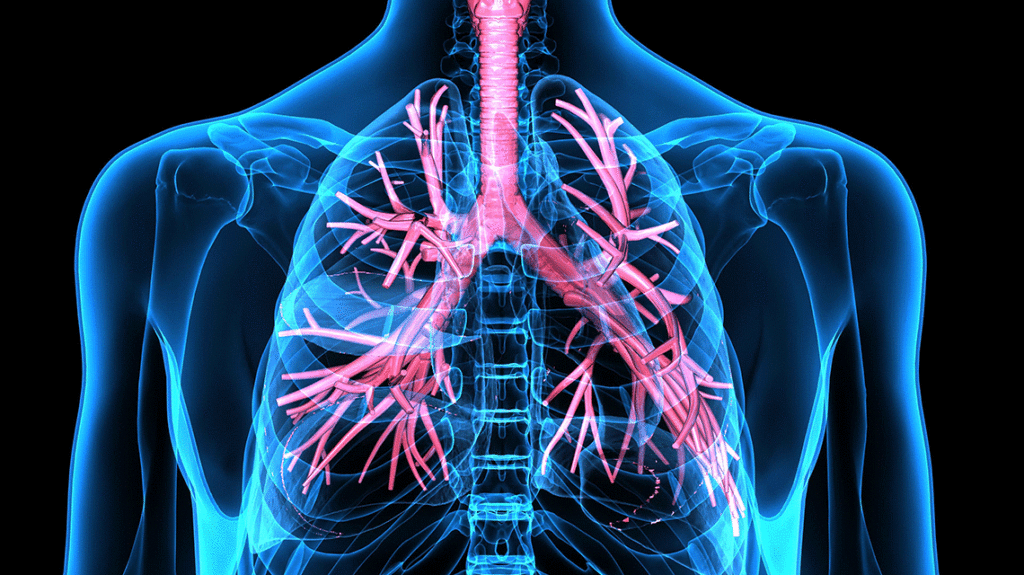Researchers Identify Proteins Triggering Imbalance of Cells in Chronic Lung Disease
Researchers Identify Proteins Triggering Imbalance of Cells in Chronic Lung Disease https://pediatricsnationwide.org/wp-content/uploads/2021/02/AdobeStock_126797930_lung-header-1024x575.gif 1024 575 Kevin Mayhood Kevin Mayhood https://secure.gravatar.com/avatar/bd57a8b155725b653da0c499ae1bf402?s=96&d=mm&r=g- November 20, 2018
- Kevin Mayhood

A protein that triggers an imbalance of mucous and ciliated cells in patients with chronic lung disease could be a target for treatments to restore airways.
Many chronic lung diseases in children and adults have one thing in common: the airway lining that normally traps and sweeps out bacteria, viruses and diesel particulates stops functioning correctly, allowing matter to accumulate and increasing the risk of infection and damage.
The reason is too many stem cells in the lining, called the epithelium, turn into mucous cells that secrete sticky mucus — the traps — while too few turn into ciliated cells that sweep the mucus out.
Now researchers at Nationwide Children’s Hospital have identified the proteins initiating the process that leads to this harmful imbalance of cells. The discovery could eventually lead to targets for therapies for cystic fibrosis, asthma, chronic obstructive pulmonary disease and more.
“We’re hopeful we can use these findings to help develop cell replacement therapies, to remake the epithelium,” says Susan Reynolds, PhD, a principal investigator in the Center for Perinatal Research.
She and Daniel Malleske, MD, MS, a neonatologist at Nationwide Children’s led the research, published in Stem Cells.
“Stem cells take cues from the local environment and those cues may not favor the desired differentiation program,” Dr. Malleske says. “What if we preconditioned the host to create a more favorable environment for stem cells to become what you want, whether that’s ciliated cells of mucous cells?”
“This study may be a first step toward manipulating pathways that help determine the fate of stem cells,” he says.
In addition to sharing the imbalance of cells in airways, many chronic lung diseases are characterized by increased WNT/β-catenin signaling. The WNT/β-catenin signaling pathway helps regulate the ability of stem cells to become different types of cells.
To find the contributors to the imbalance, the researchers tested the effects of β-catenin and different proteins regularly associated with this pathway. To begin, the research team modified their tissue culturing system so that it would normally produce tissue with equal numbers of mucous and ciliated cells. This allowed them to more easily track the increases and decreases in cell types as different proteins were boosted or inhibited in the cultures.
They found that β-catenin and the protein P300, which works with β-catenin to increase expression of target genes, promotes differentiation of stem cells into mucus cells. This occurred whether the level of β-catenin fluctuated, which is normal in a healthy lung, or was high, which is typical of a diseased lung.
They also found that when the level of β-catenin is high and interacting with either P300 or another co-activator protein, CBP, stem cells are inhibited from becoming ciliated cells.
“This study gives us some ideas about why this problem occurs and how to prevent it,” Dr. Reynolds says. “We now know how to get the process is started, but we need to understand the subsequent steps. Each step is a chance to modulate the process.”
She and her colleagues are now studying how P300 and CBP trigger inhibition of ciliated cells.
Reference:
Malleske, DT, Hayes D Jr, Lallier SW, Hill CL, Reynolds SD. Regulation of human airway epithelial tissue stem cell differentiation by of β-catenin, P300 and CBP. Stem Cell. 2018 Sep 1 [Epub ahead of print]
Photo credit: Adobe Stock
About the author
-
Kevin Mayhoodhttps://pediatricsnationwide.org/author/kevin-mayhood/
-
Kevin Mayhoodhttps://pediatricsnationwide.org/author/kevin-mayhood/April 25, 2015
-
Kevin Mayhoodhttps://pediatricsnationwide.org/author/kevin-mayhood/April 25, 2015
-
Kevin Mayhoodhttps://pediatricsnationwide.org/author/kevin-mayhood/April 25, 2015
- Posted In:
- In Brief







